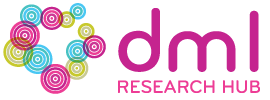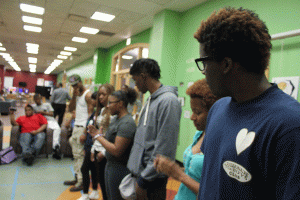Submission Deadline: February 27, 2017
The Digital Media and Learning (DML) Research Hub, in partnership with UCI’s School of Education, invites advanced graduate students and early career scholars conducting research in the field of digital media and learning to submit applications for the Digital Media and Learning (DML) Data Training Award. The award recipients will conduct secondary analysis of longitudinal data collected by the Connecting Youth Project.
The goal of the award is to engage and support scholars to conduct data analysis on a unique and comprehensive longitudinal dataset collected by the Connecting Youth project, led by UCI’s Dean of Education, Richard Arum. Participants will be invited to analyze the data set and develop a personal project such as a publication, dissertation, book chapter, or other relevant outcome. Participants will have access to staff support in order to access and analyze the data set. A detailed description of the data participants will have access to is provided below.
The DML Research Hub will provide funding for up to five advanced graduate students and early career scholars to travel to two institutes at UC Irvine in Irvine, California — one training day on June 1, 2017*, and one presentation day in spring 2018 (economy round-trip, coach airfare, ground transportation) — as well as meals, and accommodation. A data analysis and writing stipend of $500 will be provided upon attending the 2017 summer institute, and $500 upon attendance at the final presentation symposium and submission of a paper draft ($1000 total per fellow).
Expectations for participation include:
- Conducting analysis on the data set and developing a project
- Reading and providing feedback on each other’s projects
- Attending both workshops and presenting projects at the second workshop
Application Process
We welcome applicants from all disciplines, including social scientists, humanists, technologists, and education scholars. Applicants must currently be affiliated with an academic or research institution. Applicants need not be from U.S. institutions or be U.S. citizens, but must be able to obtain a U.S. visa to participate.
To Apply:
Submit a one- or two-page cover letter to dmlhub@hri.uci.edu that outlines:
- How your research interests relate to this award,
- The professional significance of participating in the DML Data Training Award,
- Your contribution to diversity and innovation in the field of Digital Media and Learning,
- A description of proposed writing or other outcome produced over the course of participation in the program.
Also provide:
- An updated CV.
- Contact information for two references who can speak to your academic work.
All application materials should be submitted to dmlhub@hri.uci.edu on or before February 27, 2017. Participants will be decided by a selection committee and notifications of selection will be sent by mid-Spring 2017. Any questions about the program should be addressed to the DML Research Hub at dmlhub@hri.uci.edu.
About the DML Research Hub
Supported by the John D. and Catherine T. MacArthur Foundation as part of its Digital Media and Learning portfolio, the Digital Media and Learning Hub is a major initiative of the University of California Humanities Research Institute. Both the UC-wide Humanities Research Institute and the Research Hub are based at the UC Irvine campus. The MacArthur Foundation launched its Digital Media and Learning initiative in 2006 to help determine how digital technologies are changing the way people, especially young people, learn, play, socialize, and participate in civic life. Answers are critical to developing educational and other social institutions that can meet the needs of this and future generations. To learn more about the DML Research Hub, visit dmlhub.net.
Description of Dataset**
Connecting Youth Project Overview
The Connecting Youth: Digital Learning Research Project, led by PI Richard Arum and postdoctoral scholar Kiley Larson, is a multi-method study of variation in behaviors, attitudes, and competencies around digital media and learning. Organizations in the study include cultural institutions that provide innovative after-school and summer programs via the Hive Learning Networks, as well as two schools in New York and Chicago. These networks and schools use innovative educational pedagogies, such as game design and digital learning, in attempts to enhance students’ interests, community awareness, and shape their educational outcomes. This project was funded by the MacArthur Foundation as part of the Digital Media and Learning initiative.
Survey Data from the Connecting Youth Project
Longitudinal pre- and post-surveys were administered to Hive program participants and consenting students at two schools, where youth ranged from about age 11 to age 18. One survey was administered at the beginning of the school year or program, and one at the end of the school year or program, beginning in summer 2011, with the most recent data collection from Hive programs in summer 2014 and the most recent data collection from the schools in spring 2016. There are data from more than 1,500 Hive surveys and more than 2,000 school surveys, but questions across surveys and years may differ.
Along with extensive demographic and home-life information, surveys gather data on students’ self-reported educational attitudes, work habits, creativity, experiences of the school or program environment, activities, utilization of technology and digital media, as well as engagement with features of the connected learning pedagogical model. As students are often present for multiple years, these surveys constitute longitudinal maps of change and development for youth at Hive programs and the two schools.
Survey questionnaires available upon request.
For more information, download the Connecting Youth Project’s presentation from DML 2016.
*Date subject to change based on participant availability.
**The clean, complete dataset will be in SAS format. In addition, all of the merging, cleaning, and coding files will be in SAS format, and it will be the responsibility of the participant to transfer SAS data into their preferred data analysis software. A comprehensive codebook will be provided, as well as access to the expertise of Connecting Youth Data Manager, Emma Mishel.


